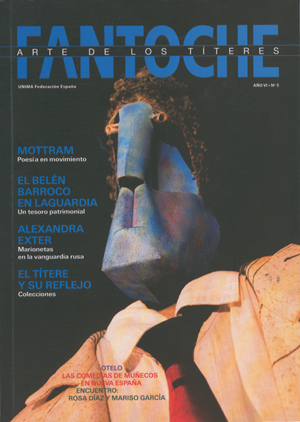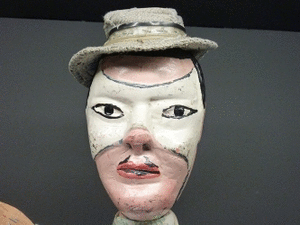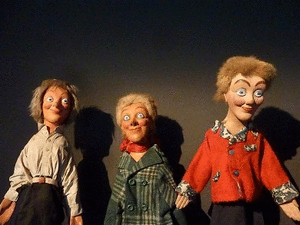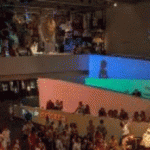 Fantoche, the magazine published by Unima Federation Spain under the tenacious directorship of Joaquín Hernández, reached its fifth issue in 2011. An enterprise which looks set for a long life ahead, its quality only increases as its field of action expands..
Fantoche, the magazine published by Unima Federation Spain under the tenacious directorship of Joaquín Hernández, reached its fifth issue in 2011. An enterprise which looks set for a long life ahead, its quality only increases as its field of action expands..
Specifically, in this fifth number the articles and texts published are all highly interesting, and are by a range of authors who excellently represent the wide world of puppetry.
To start with the editorial, signed on this occasion by Francisco J. Cornejo, in which the teacher and puppeteer from Seville stands as a spokesperson for the magazine, he defends the use of language and thought at this time of crisis and confusion. A text that is a declaration to fire up the spirit of the reader with pertinent reflections on the absurdities of the epoch we are living through.
Fantoche continues in its commitment to offering face-to-face meetings between different puppeteers, on this occasion Rosa Díaz (La Rous) and Mariso García (of Periferia Teatro), who reflect on their creative processes, and on their approaches both in terms of their aesthetics and their lives. Reflexions that have the added value of stimulating those of the reader, while offering different answers to the common problems and concerns shared by puppeteers. An honorable and sincere “face to face”, which follows the model of Fantoche’s previous, similar encounters.
The magazine then turns its attention – in a monographic – to Stephen Mottram the great British marionettepuppeteer, virtuoso of string puppets and creator of highly aesthetic and philosophical shows. We are first offered one of his texts, in which he reflects on the mask-performer dualism applied to marionettes, and in which he seeks to give life and expression to this other “I” which the puppet represents and at whose service the puppeteer places him/herself. A magnificent, biographical text by Santiago Ortega follows, full of praise for Stephen Mottram the man and the artist. The series ends with the poetic, thoughtful impressions that a photograph “in suspension and movement” of the Oxford puppeteer provokes in Ramón del Valle; as he manipulates a marionette, both puppeteerand puppet are triplicated by the camera of photographer David Burns.
Fantoche continues with a rigurous and enjoyable article by Maryse Badiou with photographs by Jesus Atienza, about the Barroque Crib in the town of Laguardia, the capital of the area of Rioja Alavesa. A text in keeping with the serious field work undertaken by the researcher from Toulouse together with Adolfo Ayuso, who participated in this expedition to the church of Santa María de los Reyes and its crib, wonderfully described by Maryse. Her text encourages one to take a car and drive to the said church in order to witness the ancient rite of Christ’s birth, represented by carved wooden figures dating from the end of the eighteenth and the beginning of the nineteenth century. A work of research that has revealed a legacy of our artistic and puppet heritage almost unknown until now.
Fernando de Julián is the author of a well researched article, accompanied by photographs of his own, about the puppets of Alexandra Exter, a member of the Russian avant-garde in the early twentieth century. The article gives an excellent introduction to the artistic ambience of the period, and draws a magnificient map of the relationships between artists, artistic movements, countries and –isms which were all part of the artistic activity of Alexandra Exter’s time. She is a figure who is as unknown as she is interesting. A world, at that time in constant turmoil, which opens up surprising panoramas of the past which, nevertheless, give the impression of reaching us live from the future.
Fernando de Julián
In the “Collections” section, Fernando de Julián offers an engaging text on the private collection of Joaquín Hernández, who is one of Fantoche’s driving forces and creator of the group Tragaluz. It will soon be possible to see the collection at his newly opened Puppet Workshop-Museum in Pola de Siero, Asturias. This is a project that Joaquín has been working on for years, and Fernando de Julián’s article makes you feel like doing your best not to miss the opening, scheduled to take place in the first quarter of 2012. Chinese marionettes with four-faced heads, shadow and glove puppets from all over the world, stamp collections with puppet themes, and piles of small objects, discovered in hundreds of unimaginable places, which have to do, in some way or other, with puppets. A fascinating project that promises to turn into an unmissable Museum.
Fantoche continues with a long, well researched article by Rey Fernando Vera García on “Las Comedias de Muñecos en Nueva España durante el siglo XVIII” (Eighteenth Century Puppet Comedies of New Spain). A detailed article based on exhaustive research in which the author introduces us to the complex and fascinating world, given their literary nature, of the marionette theatres in Mexico during the Colonial period at the end of the eighteenth century, of amazing wealth and abundance.
Called “Máquinas de comedias” (Comic theatre machines) or “Máquinas de comedias de muñecos” (Comic puppettheatre machines) or “Máquina real de comedias de muñecos” (The royal machine of comic puppet theatre), this extensive article tells us about the puppeteers’ visicitudes in relation to performance licences, the relationship between the Viceregal authorities and the Church, competition with the Royal Colisseum, and other engaging anecdotes which vivdly illustrate this little known historical reality. The article is accompanied by fascinating photographs which I assume are of puppets of the “puppet machines” refered to.
And, to end with, the director and excellent dramaturg Claudio Hochman offers us an adaptation for puppets of Shakespeare’s classic, Othello, in an agile, fresh, incisive, poetic and highly synthesized text. This is ideal for performance with glove puppets, or simply to be read and enjoyed.
This fifth number of Fantoche, once again, is an indispensable edition for libraries dedicated to the world of puppets. For more information about Fantoche, click here.
Translated by Rebecca Simpson























